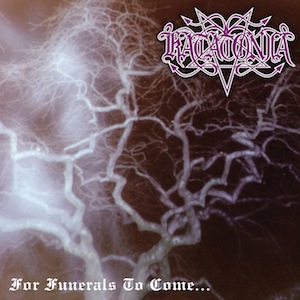A fascinating EP in that it marks the end of Katatonia’s first incarnation, ‘For funerals to come’, in the words of Anders Nystrom (who wrote the comprehensive liner notes for this edition) “ended up living up to its name, Katatonia’s funeral had come and put the first chapter and the years between 1991 – 1994 into metal history.” ‘For funerals to come’ is also fascinating because it features digital drums (much to the joy of drummer Jonas and the disdain of everyone else) and because it demonstrates Katatonia’s latent fascination with progressive song structures even in those far off, early days. Beautifully repackaged by Peaceville with a ten page booklet, liner notes and lyrics, this is a brilliant chance to explore one of extreme metal’s most enigmatic band’s early work.
Opening track ‘funeral wedding’ is a case in point. Taking its cue from doom, gothic music and black metal it initially has a Spartan sound and tormented vocals only for the band to suddenly unleash a startling progressive passage right at the heart of the song, not to mention the utterly insane, synthetic-drum-laden outro that is part Arab Strap, part Cure with a heavily processed faux-black-metal beat. It’s fascinating indeed, although not always successful and it must be noted that while the song itself is great, the drums sound simply horrid and you can understand the band members’ opposition to their inclusion. That is not to say that this is not a worthy listen – rather that one should approach with caution, for while ‘funeral wedding’ is a structurally brilliant song, there is a strong argument that it would benefit from re-recording with real drums rather than the tinny and distorted sound present on this release. ‘Shades of emerald fields’ is pure goth metal, not dissimilar to the blueprint laid down by Paradise Lost on the mighty ‘Gothic’ album and the drums here are less distracting, buried as they are beneath layer after layer of waspish guitar and plodding bass. Once again the devil is in the detail and it is remarkable that even at this early stage the level of complexity within the songs – the harmonised solos, the multiple time and mood changes, the depth of the melodies – it all points clearly to Katatonia’s current lofty position as purveyors of atmospheric and intelligent progressive metal. There are also some great metal riffs here – check out the chugging monstrosity at around the 3:40 mark which slays even despite the recording deficiencies – a stern reminder that when they choose to Katatonia can rock hard. The title track is a beautifully phrased piece of work, the guitars echoing and reverberating around the room at higher volumes crafting an atmosphere of beautiful desolation and loss. As distorted voices echo across the track, so one becomes immersed within the layers of sound and it is certainly a highlight of the EP. It also stands in stern contrast to the terrifying ‘epistel’ which feeds layers of white noise and wordless screams into a meat grinder, proving to be quite overpowering in its effective conveyance of sheer horror.
As a result of the EP’s brevity, Peaceville have added to bonus tracks to the listing for this re-issue, both of which were originally recorded for a compilation that was released by Wrong Again (later Regain) records. The first of these tracks is the phased gothic doom of ‘black erotica’, a track that sits uneasily between The Cure, My Dying Bride and Paradise Lost in the chain of inspiration. One thing that does mark these tracks out is the improved quality of the recording with the drums in particular sounding worlds better than on the first four tracks. My only slight gripe is that ‘Epistel’ is so horrifyingly intense that it seems a shame to follow it, as its impact is surely muted as a result. Nonetheless ‘black erotica’ is a great song and worthy of owning (it proved popular enough with the band for them to go into the studio and re-record it for the ‘brave murder day’ album) and it presents unique insight into the band’s early influences and aspirations. The final track ‘love of the swan’ is, perhaps, the most enlightened and elegant song here. A beautiful composition, it conveys the air of loss and mourning that predominates latter releases in a way that the other tracks here only hint at. It proves a fine epitaph to the release and a fitting close to the EP as a whole.
When one considers the heights to which Katatonia have now climbed, this EP provides fascinating insight into the band’s not inconsiderable development and it also demonstrates that, even in the early days, Katatonia aspired to be far more than just A.N other metal band – the complexity and ambition shown here makes it all the more tragic that the band would split shortly after and all the more of a reason to celebrate that they returned and went on to far greater works. As usual Peaceville have gone above and beyond to provide a re-issue worthy of such a band and the liner notes prove to be detailed, informative and interesting, whilst the extra tracks are a welcome inclusion indeed despite the fact that they do detract from the original flow of the EP with its truly horrendous conclusion. Not essential to the average listener, perhaps, this is something that will prove a treasure to Katatonia fans who joined the party later in the day and want to explore the roots of band whose release continue to be a highlight of the progressive metal world.




